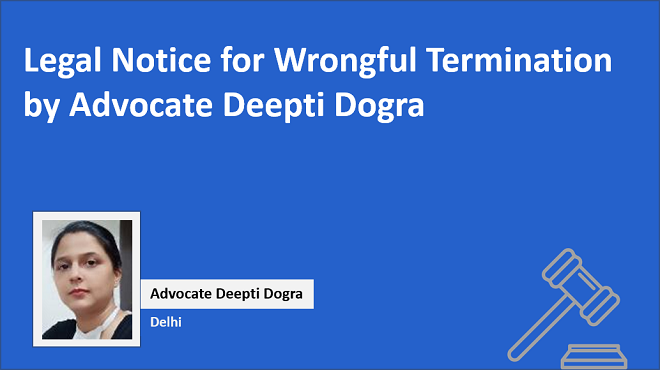How to file Writ Petition?
April 07, 2024 हिंदी में पढ़ेंTable of Contents
- What is a Writ Petition?
- “ Where there is a right there is a writ”
- What are the types of Writs?
- How to file a writ petition?
- A. Habeas Corpus
- B. Mandamus
- C. Certiorari
- D. Prohibition
- E. Quo-Warranto
- 1. Drafting a petition
- 2. Filing of application in the appropriate court
- 3. Payment of court fees
- 4. Admission and Notice
What is a Writ Petition?
A writ is an instrument or order of the court by which the Court (Supreme Court or High Courts) directs an individual or an official or authority to do an act or abstain from doing an act. A person seeking such an order can file a petition in the respective court which is known as a writ petition.
“ Where there is a right there is a writ”
The Constitution of India guarantees to its people, certain fundamental rights, which by virtue of their name are extremely basic and are required for intellectual, moral, spiritual, and general well-being and development. These fundamental rights are enshrined in the Constitution of India in Articles 14-32.
A declaration of fundamental rights is indeed meaningless unless there is an effective machinery for the enforcement of these rights. In fact, it is the remedy that makes the right real i.e. if there is no remedy there is no right at all since you cannot protect or claim your right. It was therefore thought by the makers of our constitution to provide for an effective remedy for the enforcement of these rights under Article 32 and Article 226 of the Indian Constitution. Under Articles 32 and 226, the Supreme Court of India and the various High Courts in India have been made the protectors and guarantors of the fundamental rights provided under the Indian Constitution. The Constitution under Articles 32 and 226 empowers the Supreme Court and the High Courts to issue writs for the enforcement/protection of the fundamental rights of a citizen. Thus, a person whose right has been infringed by an arbitrary administrative action may approach the court for an appropriate remedy by way of the writs.
What are the types of Writs?
The power to issue writs is primarily a provision to make available the Right to Constitutional Remedies to every citizen. Right to Constitutional Remedies is a guarantee provided by the constitution for the protection and enforcement of all the fundamental rights provided to the Indian citizens. Therefore, in order to enforce these rights, the Constitution empowers the Supreme Court and High Courts to issue writs like Habeas Corpus, Mandamus, Certiorari, Prohibition, and Quo-warranto. The parliament is also empowered under the constitution to empower any other court to issue any or all of these writs by enacting a law. These writs have been discussed below in detail:
A. Habeas Corpus
& quot Habeas Corpus& quot is a Latin term which literally means & quot you may have the body.,” This writ is issued by the courts to produce a person who has been detained, whether in prison or private custody before a court and to release him if such detention is found illegal. A Writ of Habeas Corpus can also be filed in case of violation of fundamental rights of prisoners in India.
The scope of the Habeas Corpus Writ has been widened and can be filed for the following as well:
-
If a person who has been detained has not been brought before the magistrate within 24 hours of his/her arrest
-
If an individual has been arrested without any reason or violation by him/her
-
For an unconstitutional arrest i.e. for laws against the provisions of the Constitution of India
-
Arrest made with a man intent to harm such person.
Generally, a writ of Habeas Corpus is filed by the illegal detainee. However, in certain situations, the court can also allow it to be filed by friends or relatives of the prisoner, on his/her behalf.
B. Mandamus
Mandamus is a Latin word, which means & quot We Command& quot . Mandamus is an order from the Supreme Court or High Court to a lower court or tribunal or public authority to perform a public or statutory duty. This writ of command is issued by the Supreme Court or High Court when any government, court, corporation, or public authority has to do a public duty but fails to do so.
A writ of Mandamus can be filed against an individual or private body, against the Governor, President, acting Chief Justice, etc. It can be issued to enforce a private contract as well.
A writ of Mandamus can be filed by an individual or a private body as long as they have legal rights in the matter.
C. Certiorari
Literally, Certiorari means to be certified. The writ of certiorari can be issued by the Supreme Court or any High Court for quashing the order already passed by an inferior court, tribunal, or quasi-judicial authority. There are several conditions necessary for the issue of a writ of certiorari.
-
There should be a court, tribunal, or an officer having the legal authority to determine the question with a duty to act judicially.
-
Such a court, tribunal, or officer must have passed an order acting without jurisdiction or in excess of the judicial authority vested by law in such court, tribunal, or officer.
-
The order could also be against the principles of natural justice or the order could contain an error of judgment in appreciating the facts of the case.
If subordinate courts or quasi-judicial courts act in an absence of their jurisdiction or exceed their jurisdiction or fail to make use of their jurisdiction, a writ of Certiorari can be issued.
D. Prohibition
The Writ of prohibition means to forbid or to stop. This writ is issued when a lower court or a body tries to transgress the limits or powers vested in it. The writ of prohibition is issued by any High Court or the Supreme Court to any inferior court, or quasi-judicial body prohibiting the latter from continuing the proceedings in a particular case, where it has no jurisdiction to try. After the issue of this writ, proceedings in the lower court, etc. come to an end. Comparison between issuing writs of Prohibition and Certiorari:
-
While the writ of prohibition is available during the pendency of proceedings, the writ of certiorari can be resorted to only after the order or decision has been announced.
-
Both the writs are issued against legal bodies.
E. Quo-Warranto
The word Quo-Warranto means & quot by what warrants?& quot or & quot what is your authority?& quot It is a writ issued to restrain a person from holding a public office to which he is not entitled. The writ requires the concerned person to explain to the court by what authority he holds the office. If a person has usurped a public office, the court may direct him not to carry out any activities in the office or may announce the office to be vacant. Thus, the Supreme Court or High Court may issue a writ of quo-warranto if a person holds an office beyond his retirement age. Conditions for issuing Quo-Warranto
-
The office must be public and it must be created by a law or by the constitution itself.
-
The office must be a substantive one and not merely the function or employment of a servant at the will and during the pleasure of another.
-
There must have been a contravention of the constitution or a statute or statutory instrument, in appointing a such person to that office.
How to file a writ petition?
Writs provide a fast and inexpensive remedy for the protection of fundamental rights from legislative and executive interference. According to the Constitution, a writ petition can be filed directly either in the Supreme Court or the High Courts. It can be filed for the enforcement of a fundamental right either in a civil or a criminal suit. A writ petition can be filed by following the below-mentioned procedure:
1. Drafting a petition
The first step in filing a writ is to draft a writ petition elaborating your case with details related to the infringement of the fundamental right. Depending upon the type of your right affected and the organization involved, the facts of the case should be mentioned in the petition. It is advisable to hire a good lawyer to draft a petition for you as a lawyer having significant experience in dealing with writ petitions will be able to make a better case for you in the petition while increasing your chances to get a favorable order from the court.
2. Filing of application in the appropriate court
Based on the area where the problem arose, the appropriate court (High Court or Supreme Court) to file the writ petition is decided. A lawyer can guide you with the place of filing and can also help you with the filing while saving you from the tedious process of applying to court.
3. Payment of court fees
While filing the writ petition in the appropriate court the prescribed court fees will have to be paid by the applicant. The court fee may vary based on the court and the length of the petition.
4. Admission and Notice
Once the petition is successfully filed after paying the requisite court fees, a preliminary hearing will be held wherein the petition will be considered by the court for admission. The court will consider the petition based on the facts of the case that whether it is liable to be taken further or not and if it is found to be fit, the next date of hearing will be provided by the court. A notice will also be sent to the other party to appear before the court on the given date of hearing. In the final stage, the court will consider the contents of the petition and after hearing the submissions made by both the parties will give a decision as it may deem fit. Dr. Ambedkar in one of his Constituent Assembly debates had stated that “ If I was asked to name any particular Article in this Constitution as the most important- an Article without which this Constitution would be a nullity--- I could not refer to any other Article except this one (Article 32)& hellip & hellip & hellip & hellip & hellip & hellip & hellip .. It is the very soul of the Constitution and the very heart of it.” The powers conferred over the High Courts and Supreme Court to issue writs under the Indian Constitution is an important part of the & lsquo basic structure of the Constitution. The reason for this is that it would be meaningless to provide fundamental rights to the citizens without providing an effective remedy for their enforcement when they are violated. This is why an application to the Supreme Court may always be made first since the right to protection of a fundamental right is itself a fundamental right. Therefore, there is no need to approach the High Court before the Supreme Court when filing a writ petition.
These guides are not legal advice, nor a substitute for a lawyer
These articles are provided freely as general guides. While we do our best
to make sure these guides are helpful, we do not give any guarantee that
they are accurate or appropriate to your situation, or take any
responsibility for any loss their use might cause you. Do not rely on
information provided here without seeking experienced legal advice first. If
in doubt, please always consult a lawyer.
The internet is not a lawyer and neither are you.
Talk
to a real lawyer about your legal issue.

Comments by Users
No Comments! Be the first one to comment.
Related Articles
- Police Clearance Certificate for passport if criminal case pending
- How to file a case through lok adalat?
- How can I convert the panchayat approved land to a DTCP or CMDA
- Case was dismissed due to non appearance can I restore the case
- someone sending the legal notice i have not accepted what will happpen
- How to file a complaint in National Green Tribunal (NGT)? | Civil Law Guide
- Separation of powers in administrative law in India
- OBC Non Creamy Layer Income Limit 2019 Criteria
- punishment for false affidavit
- I got show cause notice from passport office please advise what to do
- What is the validity of an agreement on Rs 10 stamp paper
- What is the basic difference between Section / Rule / Article /Act
- What is the procedure and grounds for filing defamation case
- Have received court challan what to do.
- Police verification for govt job
- How to File Writ Petition?
Legal Questions Answered by Top Lawyers
Civil Law Articles
User Reviews
thank you for the article
nice artcile
thanks for the information
very well written
learned all the basics about the legal issue. Good article. Keep it up.
good legal subject
its very helpful on the subject
informative
good article. Can you share more detail
Understood the subject with clarity.
Detailed and informative.
Very good article
good work
I have a case. Who can I contact?
how to contact a lawyer for my legal case?
thank you for the information
VIEW ALL


 682+ Lawyers are online
682+ Lawyers are online 














